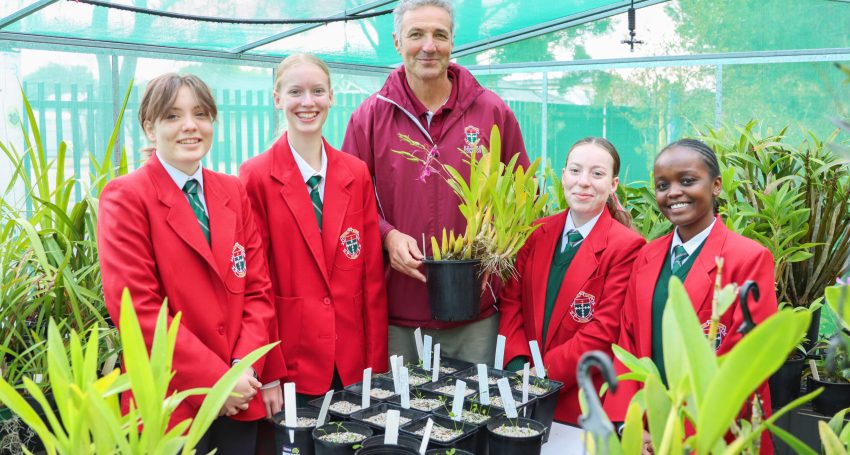Cultivating the next generation of ecologists
Schools
There’s a certain kind of magic about orchids. Kildare College teacher and environmental stewardship advocate Paul Beltram knows just how much we can learn from nature’s tiny works of art.

“Orchids are fascinating because they showcase incredible evolutionary diversity, with over 25,000 species that have adapted to a wide range of environments,” Paul says.
“Their reproductive strategies are uniquely complex, often involving intricate relationships with specific pollinators, including deceptive tactics like mimicking the appearance and scent of female insects.”
Helping students discover the wonder of nature is Paul’s job and part of the reason he was the recipient of the 2024 Catholic Education Award South Australia for Laudato Si’.
Advertisement
During his 24 years at Kildare College, Paul’s roles have spanned biology teacher, learning leader, pastoral care and, most recently, leading the Material Solutions Course.
Propagating endangered orchids is a part of that learning process.
The Orchid Club and Kildare College collaborate with the Adelaide Botanic Gardens to propagate threatened orchids and other flora.
“It started with the Orchids in Schools program, run by the Orchid Club of South Australia,” Paul says.
“The club organised a mentor to assist with the program. Fortunately for Kildare College, our assigned mentor was someone I admired and respected my whole life for his work in the conservation of native orchids.”
Paul is referring to Les Nesbit who has promoted the conservation of native orchids for more than 50 years as a propagator and exhibitor and has volunteered his services at Kildare over the past eight years.
Les maintains the college’s purpose-built orchid shade house and horticulture facilities. He has also demonstrated and taught more than 200 students how to grow orchids.
Another of Paul’s initiatives is the Wirra Garden which has been integral to Kildare’s First Nation initiatives and programs.
“The Wirra was the site of the first smoking ceremony at the College, which acknowledged the importance of continuing to deeply embed and recognise the role of Kaurna environmental stewardship,” Paul says.
The garden was established from remnant native scrub from Hope Valley reservoir.
Uniquely adapted to the specific environmental conditions such as soil, climate, and interactions with other local species, the plants support local ecosystems by providing food and habitat for native wildlife, including insects, birds, and mammals.
Paul’s interest in ecology was encouraged by his late father, who regularly took the family on outings to conservation parks across Adelaide and the Fleurieu Peninsula.
“Although my father wasn’t an ecologist, he had a deep interest in the unique and biodiverse flora and fauna of the region, even though he was a migrant from Northern Italy,” Paul says.
“He not only shared his passion in the natural world, he loved astronomy and studied the celestial charts published in the local papers each week and would point them out to me often – this built a sense of awe and wonder in the world around us.”
Advertisement
Paul’s father also had a passion for gardening and organic farming and took great pride in his large vegetable garden.
“My father planted native flora on his property to attract honeyeaters, parrots and small insect-eating birds – he understood these animals were not a hindrance and could share the space and even assist in organic farming methods. He also had a fascination in birds of prey and I will never forget the time he successfully rehabilitated a Collared Sparrowhawk that he found injured near the West Beach golf course.”
Paul in turn derives great satisfaction from seeing students develop a deeper appreciation for the natural world.
“I enjoy witnessing the ‘aha’ moments when students understand complex ecological concepts and see the connections between ecosystems, human impact, and environmental sustainability,” he says.
“Engaging students in hands-on activities, like fieldwork or experiments, and watching them apply what they’ve learned to real-world problems also brings a great sense of accomplishment. I am no different to most teachers who find it rewarding to inspire a sense of environmental stewardship in their students, knowing they are helping to shape the next generation of informed and responsible citizens.”
Paul believes environmental education gives a sense of responsibility and connection to the natural world from an early age.
“This early engagement helps them understand the impact of their actions on the environment and encourages sustainable habits that can last a lifetime,” he says.
“By instilling these values early, we empower the next generation to protect and preserve the planet for future generations.”
Kildare’s informed and engaged young community give Paul hope for a positive future.
“There is no reason to despair with the foundational beliefs of our Catholic schools. The Christian hope is one of restoration and renewal,” he says.
“This can give us great poise, peace and engagement. In particular, this hope shapes the way I teach about justice and conservation of the earth’s natural resources. This hope doesn’t need to be taught explicitly at Kildare College as it is embedded in our core values and taught implicitly.”







